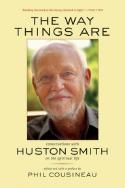Issue Date: February 6, 2004
Religion scholar argues the West needs to revive a sense of transcendence Reviewed by RICH HEFFERN Huston Smith is firmly convinced that religion matters, that the wisdom of our spiritual traditions provides the essential map and compass that will enable us to navigate safely though the shoals and reefs lurking in the waters of this new century. Religion’s preeminent regard for transcendence provides essential nutrients for the human spirit and the human enterprise. Professor emeritus of philosophy at Syracuse University, Huston Smith is author of The Religions of Man, Forgotten Truth, Beyond the Post-Modern Mind and the bestseller Why Religion Matters. He is the premier scholar today of the world’s religions. Editor Phil Cousineau has gathered numerous interviews conducted with Smith over the years. There are magazine and newspaper interviews together with documentary film transcripts and a few essays. Smith recounts his encounters with such luminaries as Joseph Campbell, Aldous Huxley, Ram Dass, Daisetz Suzuki and the Dalai Lama. He ranges over a wide variety of topics. “Religion for me is the search for the Real, and the effort to approximate one’s life to it,” Smith says. His own search has taken him around the world and deep into the study of everything religious, from Zen’s haikus to the Siberian shaman’s rattle to the sophisticated ontologies of Hinduism. In one interview, he tells of attending a gathering of chiefs and spiritual leaders of the Iroquois nation in upstate New York. After talking with them at great length, Smith was told by one of the leaders, Oren Lyons, “Well, it’s time to begin. Huston, that means we are going into the Long House and you are not. We know you are a loyal friend, but the story of Handsome Lake is sacred to us, and we will be rehearsing it in our sanctuary. It’s not a time for spectators.” Smith recalls that he didn’t feel at all rejected, but rather recognized a surge of exaltation rising in him. “It was just thrilling to me to discover that there are still people on our planet who think there are things so sacred that they could be profaned by the presence of outsiders.” On the basis of his encounters with the religions of native peoples in this country and elsewhere, he revised his book The World’s Religions to include the wisdom of indigenous religions worldwide. Smith describes his current interest in reconnecting with his Christian roots, after ranging widely in his studies of Taoism, Hinduism, Buddhism and Islam. He says to one interviewer, “I have been approaching Christianity this time as if it were a foreign religion like the others I have encountered, which in many ways traditional Christianity is in our modern, secular age. … Approaching it this way strips away many stereotypes. I’m finding that in its depths, St. Augustine, Dionysius, Meister Eckhart -- not the third-grade Christianity one hears from most pulpits -- this new (to me) Christianity is more interesting than that of my childhood.” A key theme in Smith’s scholarship and writing is the tension between science and religion. Smith has chronicled the encroachment of what he calls “modernity,” the scientific mindset that reduces reality to that which is visible and measurable. Smith believes that in the attempt to apply science’s methodology to realms of knowledge that are really beyond science’s reach, we have succeeded in eliminating the transcendent from our worldview. “The Western hunt for knowledge,” he says, “has violence built into it. For to know analytically is to reduce the object of knowledge, however vital, however complex, to precisely this: an object. … To approach existence as if it were purely or even primarily physical and mathematical is to falsify it. This approach could end in smashing our planet, for if a hammer is the only tool one learns to use, it is tempting to regard everything as if it were a nail.” Smith wants a return of the sense of the transcendent to an equal place in our thinking about the world around us. Without it, we have an impoverished sense of what the world includes and of what it means to be human. Yet Smith is no enemy of science. His quarrel is with what he calls “scientism,” that tendency to go beyond the actual findings and then deny other approaches to knowledge. “Science is a very powerful instrument, nearly perfect for understanding the material world, but it cannot address anything other than the material world.” Journalist Bill Moyers asks Smith what he means by transcendence. Smith replies that it is that “perfect being that embodies all the positive qualities we experience in this life. Let’s tick them off: intelligence, compassion, creativity, the classical virtues of truth, beauty and goodness. All of those virtues we experience are like fingers pointing at the moon. The finger never reaches the moon, but it’s very important to be pointing in the right direction … This is the insight that bubbles up from the deepest unconscious of the spiritual geniuses of humankind.” Smith takes religious yearnings seriously. Indeed, he feels they are the most essential part of our human makeup, yet the ones that are the least satisfied by our modernist cultural milieu. He quotes Mother Teresa, who lamented the “desperate material poverty in India, desperate spiritual poverty in the West.” Huston Smith’s ruminations are radiant, rich, passionate, informed and thought-provoking. They will remind you once again why religion matters so much. Rich Heffern is author of Daybreak Within: Living in a Sacred World (Forest of Peace). His e-mail address is heffern@diocesekcsj.org. National Catholic Reporter, February 6, 2004 |
